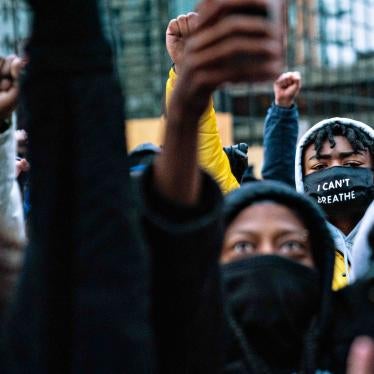(Washington) U.S. President George W. Bush and Congressional leaders should press for concrete steps to improve human rights when they meet with Chinese Vice President Hu Jintao this week, Human Rights Watch said today, pointing out the lack of any progress on human rights since Bush's visit to China in February. Hu Jintao, the likely successor to President Jiang Zemin, will pay his first visit to Washington on Wednesday, May 1.
The Administration must step up the pressure. There's been no improvement in human rights in China this year, and conditions worsened in some ways last year," said Mike Jendrzejczyk, Washington Director for the Asia Division of Human Rights Watch. "Hu needs to understand that China's international human rights obligations are a key issue in U.S.-China relations."
The U.S. has urged China to release political and religious dissidents, but there have been no prisoner releases since Bush's trip, nor has China taken any steps towards ratifying the International Covenant on Civil and Political Rights, or to ease harsh repression in Tibet and Xinjiang. Beijing continues to try to justify its crackdown on ethnic Uighurs in Xinjiang on anti-terrorism grounds.
Massive labor unrest in northeast China in early April led to the detention of several worker representatives. Laborers throughout China are likely to continue to take to the streets to express their grievances. The Chinese leadership has ignored offers of assistance from the International Labor Organization to help institute reforms allowing greater freedom of association among workers.
Human Rights Watch urged President Bush and Vice President Dick Cheney in their meetings with Vice President Hu to also make clear U.S. concerns about serious human rights abuses in Tibet. Vice President Hu has long been associated with China's policies in Tibet. In late 1988, he was appointed Secretary of the Tibet Autonomous Regional Communist Party Central Committee following a series of massive protests in support of Tibetan independence the previous two years. He moved quickly to repress another massive protest in March 1989, declaring martial law and ordering wide scale arrests. He later helped develop Beijing's ongoing policy towards Tibet that combines the promotion of economic development with political repression. The U.S. ambassador to China, Clark Randt, Jr., visited Tibet from April 5-10.
Both Senate Majority leader Tom Daschle and House Speaker Dennis Hastert are scheduled to host meetings with Vice President Hu on Capitol Hill. Human Rights Watch urged them to obtain Hu's agreement for a visit to China this year by the new Congressional-Executive Commission on China, a special body set up to monitor progress on human rights and the rule of law. Congress set up the Commission when it voted for Permanent Normal Trade Relations (PNTR) for China in October 2000.
"Some might be tempted to play down human rights with Hu, since it's his first visit here. But that would be a major mistake," said Jendrzejczyk. "Differences over human rights should be dealt with candidly and constructively, not swept under the rug."





